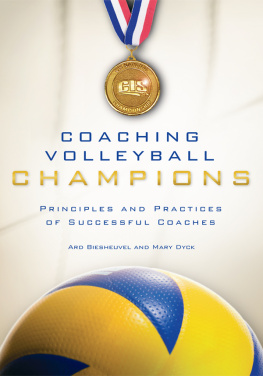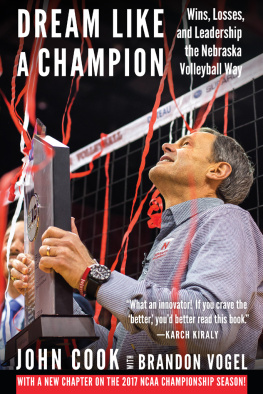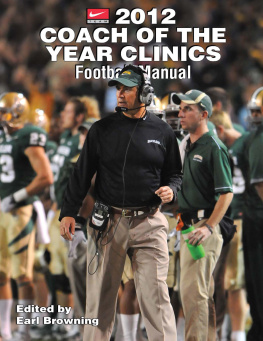Praise for Coaching Volleyball Champions
Coaching Volleyball Champions will stimulate you to think about how you do what you do. Some of the information may challenge the reader to rethink or reinterpret some of his or her own beliefs about coaching effectiveness and performance enhancement. Other times a reader may take exception to statements. This is what we need in coaching: more dialogue, more interaction, more critical thinking. If you are interested in challenging your approach to coaching you need to read this book.
Mark Tennant, University of Saskatchewan
1979, 1980, 1981: Coach, Canadian National Womens University champions Chairman Volleyball and Beach Volleyball, International University Sports Federation (FISU) Member, Technical and Coaches Commission, North America, Central America, and Caribbean Zone (NORCECA)
Coaching Volleyball Champions is a remarkable addition to the volleyball literature that I am certain any serious coach will want to read, study, and absorb; then return to again and again. Ard Biesheuvel and Mary Dyck have provided a most impressive resource that demonstrates the wide variety of approaches used by some of the most successful and well-known coaches in the history of our sport. These experts answer many of the most important and frequently asked questions that all of us deal with as coaches.
Just employing the drills at the end of each section will aid your teams training and help you focus on the most important areas to address in practice. This alone is worth the purchase price. Every reader will pick up something from this bookand from each coachs sectionto help them become a better coach. I highly recommend this book. It is absolutely a must have and regular read!
Douglas P. Beal
CEO USA Volleyball
I invite you into a coaching book that is brimming with insight, as some of the best coaches in North America give you a backstage pass to their programs. Coaching Volleyball Champions has the potential to help you coach from a more confident, relaxed, and productive platform. If you are like me you enjoy setting goals and achieving them as a coach, yet in this profession success can be increasingly elusive.
The coaches profiled in this book can help you uncover profoundly simple ways to improve your knowledge of the game and ability to deliver that knowledge to your athletes. There are decades of ideas here that have been fine-tuned and will be applicable to you.
The effectiveness and power of this book is based on the practical ideas and drills that exist between its covers.
Greg Ryan
Former University of Calgary Mens Volleyball Coach
1989 and 1993 CIS National Champions Director of Athletics and Campus Recreation Augustana Campus
University of Alberta
Coaching
Volleyball
Champions
Principles and Practices
of Successful Coaches
Ard Biesheuvel and Mary Dyck
Foreword by Hugh McCutcheon

Table of Contents
Foreword
C oaching is a complex job. Theres more to it than people thinkor maybe want to believe. Coaching also carries with it a great responsibility. Athletes, staff members, institutions, and sometimes countries will invest their time and energy into the team that you are leading. Theyre giving you their lives and their resources with the expectation that you can help them achieve a common goal. As the coach, you need to respect that investment and do everything you can to generate a decent rate of return. Ultimately, we are service providers; we are facilitators of change and achievement. Its a job like no other, its special and unique, and when someone calls you coach it should be because youve earned the right to be called that.
Generally speaking, coaching requires strong character (honesty, integrity, and consistency), knowledge of the game, and a solid grounding in the fundamentals of teaching, communication, and sports science. Now, given that there are a lot of books out there on coaching volleyball, and an exponentially higher number than that on coaching in general, whats so special about this one? How can the information contained in these pages help you become a better coach? Well, in my opinion, this book is different. In fact, its one of the best collections of anecdotal volleyball knowledge Ive ever read. Ard and Mary have interviewed some of the best coaches, not only in North America, but the worldand most important, theyve asked the right questions and gotten some great answers. All of the information you need to coach a team (teach, train, develop team culture, and compete) is contained in these pages. There are no lists, there isnt any spoon-feeding going onbut anyone who can read between the lines will find the principles required for building successful (in all of its numerous definitions) teams and programs.
I never really planned on being a coach. Its just something that happened while I was trying to do something else. It was initially a means to a different vocational end. Fortunately, I was afforded some opportunities to work with, and learn from, some of the best coaches in our sport (McGown, Dunphy, and Beal, to name a few). I also had the chance to play volleyball in different countries and see the sport through some different philosophical lenses. The culmination of these experiences and interactions, combined with my academic preparation, were critical in my coaching development. And heres the point: when I read this book, I see in these pages a lot of the lessons I was fortunate enough to learn early in my career. There are different ideas and methodologies presented, different cultural norms and values, but the principles of coaching, teaching, and functional team dynamics are all in here. The challenge for you, the reader, is to figure out which of these principles you should apply to your coaching. What can you learn from these successful and experienced volleyball coaches that will help you realize your teams collective potential? Good luck and enjoy the journey.
Hugh McCutcheon, Head Coach
USA Womens National Volleyball Team
Former Head Coach USA Mens National Volleyball Team
2008 Olympic Champions
2008 World League Champions
Preface
W hat does it take to become a successful volleyball coach? Why do some coaches win year after year at national and international levels? What do they think about when coaching? How do they select and prepare their players? What practical advice and activities would they share that any volleyball coach and player (rookie or veteran) could find beneficial? This book features eleven of the
most successful volleyball coaches in North America. While there are many books out there on great coaches in a variety of sports, no book has featured winning volleyball coaches and their keys to success. Until now.
Why do these coaches win? Are they better recruiters, better motivators, better teachers, better strategists, better leaders, better planners? Or have they simply encountered better opportunities? Do the answers lie in none of the above or in all of the above? This book answers these questionsand more.
The purpose of Coaching Volleyball Champions is twofold. First, we, the authors (longtime volleyball coaches), spoke directly with some of North Americas greatest and most successful volleyball coaches in hopes that they would offer insights into coaching at a highly competitive level. The coaches selected for inclusion in this book have won at least two or more national or international championships. Coaches have also been selected to represent the entire scope of volleyball and include male and female coaches as well as coaches of male and female volleyball teams. Interview questions were gleaned from other publications that focus on successful coaches and coaching, as well as solicited from other volleyball coaches. We asked each coach roughly the same questions and encouraged them to provide examples from their own experiences.








